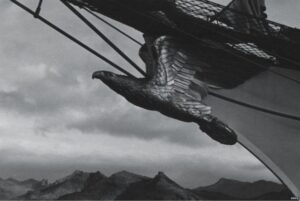The stories of the Esmeralda tall ship being a torture ship under Pinochet’s regime in Chile are no worse than the history of our own Coast Guard’s magnificent training ship, the Eagle.
That three masted square rigger was once the Horst Wessel, a ship under Hitler during World War II. It was named to honor the man who was a follower of Hitler and actually wrote the Nazi national anthem, a man who reports said was killed by his girlfriend’s ex-lover. the ship was turned over the United States when the Allies were divvying up the spoils of World War II.
But the renamed Eagle has a wonderful story of its past before becoming the training ship at our Coast Guard Academy in New London.
Commander Gordon McGowan was the seamanship instructor at the Coast Guard Academy and had seen service with the Coasties since Prohibition times when he served on a destroyer.
The Coast Guard had seen the benefits of seamanship training on a tall ship during the war when its cadets trained aboard the Danmark while it was in American waters after the Nazis invaded Denmark. So when the Horst Wessel came up for grabs among the Allies, Commander McGowan was given orders to go to Bremerhaven and sail the war prize back to America.
And so he did, but not without excitement and his own extreme naval capability and dexterity at sea.
First the ship was in Bremerhave harbor in a city reduced to nothingness from the war; it was in bad shape and at the bottom of the Weser River when the tide was out. There was still a German crew aboard, with no navy, no orders, and no place to go.
McGowan had a compliment of 50 Coast Guardsmen, but knew he needed another 250 more in order to sail the vessel. So he simply negotiated, was friendly and communicative with a willing and eager Bertold Schnibbe who was still “in command” of the poorly maintained ship and took on many of the former German sailors under his own direction.
It took a couple of months to get the necessary parts, including even paint in war-torn Germany to get the Horst Wessel into shape to sail, but when she was ready, the name, of course had to be changed as well.
Since Eagle has long been associated with the Coast Guard, the name was chosen and the shipyard crew who had been working so hard on all the repairs, gave the new crew a piece of teak, hand-carved into a shield, to replace the swastika the wooden eagle clutched in his talon.

The Eagle was commissioned in the US Coast Guard on May 15, 1946.
Once at sea, life was no easier, Just before leaving, Commander McGowan learned there was a stowaway aboard and he had to reluctantly advise the Coasties who were trying to help the young orphan, the boy could not be smuggled back to America.
There were good days in England and and some more calm sailing as they crossed the Atlantic; there were festive stops in Madeira and Bermuda, and life on the open sea in a magnificent tall ship seemed too good to be true.
It was…
Two days out of New York, the Eagle ran into a hurricane that ripped apart the topsails and most of the remaining sails. The ship’s captain had to face the heavy seas and high winds and let his new ship ride out the rest of the storm. But he did and the battered but proud ship sailed into New York, dropped off its German crew members to a POW camp, and sailed on to New London where the Eagle began its career as the Coast Guard Academy’s training ship.